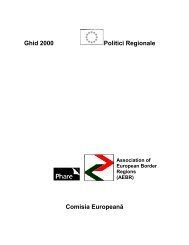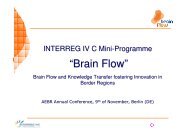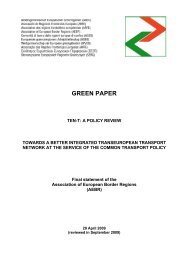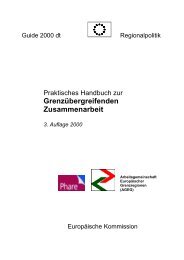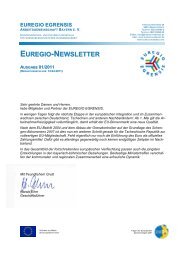Summary Barca-Report E 27-08-09 - Association of European ...
Summary Barca-Report E 27-08-09 - Association of European ...
Summary Barca-Report E 27-08-09 - Association of European ...
Create successful ePaper yourself
Turn your PDF publications into a flip-book with our unique Google optimized e-Paper software.
Anlage (Nr. einsetzen) zum Protokoll der AGEG-Präsidiumssitzung am 5. Juni 20<strong>09</strong> in Burg (D)<br />
bypassing the territorial relations and believe that the state knows everything better. A<br />
territorial social agenda as part <strong>of</strong> the cohesion policy is required (social contract <strong>of</strong> the<br />
EU-citizens).<br />
2. Territorial or „place-based“ dimension<br />
Within the cohesion policy there is not sufficient knowledge concerning what is<br />
influencing and accelerating economic change. The result is a wrong interpretation.<br />
There is a tendency to hinder the territorial character (place-based) and to put him in the<br />
corner “spatial planning”. He is considered separately from the economic and social<br />
perspective and not as a way to realise both dimensions. Such a perspective is only<br />
used in a limited way for programmes (in territorial cooperation, Leader, Urban).<br />
3. Recommendations to improve the present regulations<br />
• Legally defined administrative NUTS-II regions are more suitable as reference<br />
level for policy than for the management <strong>of</strong> EU-programmes.<br />
• The result is that the convergence <strong>of</strong> legal NUTS-II regions is considered to be an<br />
objective <strong>of</strong> the cohesion policy.<br />
• Multi-level governance necessary for the local development policy has to combine<br />
conditionality and subsidiarity.<br />
• National strategies and operational programmes up to now missed the point <strong>of</strong> an<br />
commitment <strong>of</strong> states (and their regions) in order to met EU-criteria.<br />
• In most strategies and operational programmes is not described in a sufficient way<br />
how the objectives and results will be achieved and which instruments will be used<br />
for their implementation.<br />
• In the same way data on quantitative outputs and results are weak.<br />
• The N+2 mechanism requesting to spend money within a certain period <strong>of</strong> time is<br />
even perverting this mechanism: Spending money is more important than<br />
presuming objectives and strategies.<br />
3<br />
AGEG/AEBR/ARFE / Enscheder Str. 362 / D-48599 Gronau / Tel.: 0049 2562 70219 / Fax: 0049 2562 70259<br />
info@aebr.eu / www.aebr.eu



